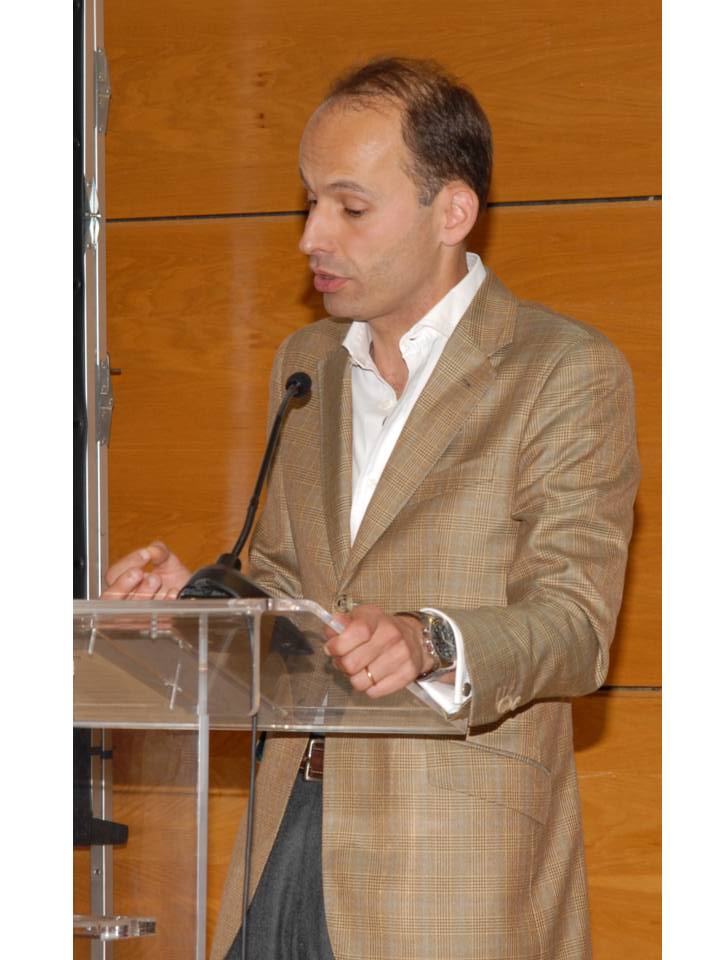 Professor Bhimani and Minister Soares award a Lifelong Learning Certificate to one of the eldest graduates in the programme. Phirbhai
Professor Bhimani and Minister Soares award a Lifelong Learning Certificate to one of the eldest graduates in the programme. PhirbhaiA graduation ceremony for the third cycle of the Lifelong Learning Certificate Programme was held at the Ismaili Centre, Lisbon this spring. Thirty-seven graduates, hailing from France, Germany, Portugal and the United Kingdom, received a Certificate in Lifelong Learning from the London School of Economics. They join a growing body of alumni that numbers more than 200.
Lifelong learning adderesses the growing need for workers with specialist skills, providing a means to keep up with the fast pace of change in today's knowledge society. In March 2000, lifelong learning emerged as a key policy outcome of the Lisbon Special European Council, and is seen as an important strategy in the face of an ageing population and today's weak labour markets.
The graduation ceremony was attended by a distinguished audience that included the Portuguese Minister of Solidarity and Social Security, Dr Pedro Mota Soares, who delivered the keynote speech, and the Presidents of the Ismaili Councils for Portugal, France and the United Kingdom – Amirali Bhanji, Karim Valimamode and Amin Mawji. Professor Alnoor Bhimani, Head of the Department of Accounting at the London School of Economics, presided over the awarding of certificates to the graduates.
 Dr Pedro Mota Soares, Portuguese Minister for Solidarity and Social Security, speaking at the graduation ceremony of the Lifelong Learning Certificate Programme, held at the Ismaili Centre, Lisbon. Phirbhai
Dr Pedro Mota Soares, Portuguese Minister for Solidarity and Social Security, speaking at the graduation ceremony of the Lifelong Learning Certificate Programme, held at the Ismaili Centre, Lisbon. PhirbhaiIn his remarks, Minister Soares praised the Ismaili community and cited the Aga Khan Development Network as a strong partner in establishing a new social paradigm that sees governments, communities and private social institutions as jointly responsible for social welfare.
“Portugal as well as others countries have a very sensitive theme to look after: an ageing of the population, and the conditions in which people grow old,” said the Minister. “One of the most important factors is good education.”
Lifelong learning in Europe
European and global societies are transitioning towards an economic model that is increasingly reliant on knowledge and technology. Keeping abreast of change is essential to remaining competitive, creating new opportunities, and sustaining quality of life. In such a world, lifelong learning can be a source of social and economic cohesion.
Too often however, the value of education is equated with the prospect of career advancement, or its role in preparing youngsters for working life. While certification has enabled many graduates of the programme to gain the skills and confidence to advance in the job market, for others it can provide a forum for personal development, broadening one's intellectual, social and spiritual horizon.
 Safira Firozali, member of the Ismaili Council for Portugal responsible for the Lifelong Learning and Step-by-Step programme. Phirbhai
Safira Firozali, member of the Ismaili Council for Portugal responsible for the Lifelong Learning and Step-by-Step programme. PhirbhaiThis was evident in the third cycle of the Lifelong Learning Programme, which saw a record number of Portuguese participants – most of whom were women. In addition to those awarded certificates, many more chose to pursue courses without seeking certification, motivated simply by a desire to learn.
Lifelong Learning is “where we gain conscience and change ourselves, while impacting others,” says Safira Firozali, the member of the Ismaili Council for Portugal responsible for the Lifelong Learning and Step-by-Step programme.
Source of success
Created in 2006 by the Ismaili Council for Portugal, the Step-by-Step Learning Centre is a platform for the Lifelong Learning certification, and has been recognised as a successful European model. The centre focuses on three main areas: general studies, vocational courses and learning for seniors.
Much of the success of Lifelong Learning is due to its flexibility in adapting to the contexts of participants in each country. Students tend to respond more positively to courses with which they identify, and that serve their expectations.
 Ismaili Council President Amirali Bhanji and Professor Alnoor Bhimani from University of London in conversation. Phirbhai
Ismaili Council President Amirali Bhanji and Professor Alnoor Bhimani from University of London in conversation. PhirbhaiMinister Soares noted that “lifelong learning is a concept through which by recycling our knowledge, we manage to preserve the utility and dignity of those who are older, and by doing this they find a new challenge in their lives, as well as their communities and our generation.”
“The Ismaili community represents the power of community and the power of people that strongly believe that our world can be better if we also look toward others, instead of only looking at ourselves in the mirror.”






